This article was co-authored by Joshua Ellenhorn, MD. Joshua Ellenhorn, MD, is a board certified surgeon with advanced training in the fields of surgical oncology, minimally invasive surgery, and robotic surgery. He runs a private practice at Cedars-Sinai Medical Center in Los Angeles, California and is a nationally recognized leader in surgery, cancer research, and surgical education. Dr. Ellenhorn has trained more than 60 surgical oncologists and has spent over 18 years in practice at the City of Hope National Medical Center, where he was a professor and the chief of the Division of General and Oncologic Surgery. Dr. Ellenhorn performs the following surgical procedures: gallbladder surgery, hernia repair, colorectal cancer, skin cancer and melanoma, gastric cancer, and pancreatic cancer. He earned an MD from the Boston University School of Medicine, completed fellowships at the University of Chicago and Memorial Sloan-Kettering Cancer Center and finished his residency in surgery at the University of Cincinnati.
This article has been viewed 62,972 times.
Colon cancer is the third most common cancer. However, there are excellent screening tests available and, when caught early, colon cancer is able to be treated and cured in 90% of all cases.[1] This is why following through with the recommended screening is so important. See your family doctor to learn how to self-screen for colon cancer via the at-home stool test, which is recommended every one to two years for people over the age of 50. Though colon screenings performed by trained doctors are always best, an at-home test is better than nothing and could point out issues that you'll need to address.
Steps
Performing The At-Home Stool Test
-
1Evaluate your level of risk for colon cancer. Everyone is eligible for colon cancer screening beginning at the age of 50; however, if you have a family history of colon cancer, or a personal history of inflammatory bowel disease (such as Crohn's disease or ulcerative colitis, both of which increase your risk of developing colon cancer) you may be eligible to begin screening earlier.[2] Don't wait to discuss this with your doctor — even if you are still young, it is important to notify your doctor if you have any risk factors.
- See your doctor at age 50 to begin self-screening, and earlier if you believe you have additional risk factors (in which case your doctor will let you know at what age you are eligible to begin).
-
2Obtain the testing package. The first thing you will need to do in order to self-screen for colon cancer is to obtain the at-home stool testing package. You will need to visit your family doctor to obtain this, and she will explain the procedure to you during this visit as well.
- One stool test is called the Fecal Occult Blood Test (FOBT). This looks for blood in your stool that is not visible to the naked eye. It is the most commonly used self-screening test for colon cancer.[3]
- Another stool test option is called the Fecal Immunochemical Test (FIT). This is almost the same as FOBT, except instead of detecting blood via heme it detects it via antibodies directed at human hemoglobin.[4]
- The final self-screening stool test option is called Cologuard. This evaluates both for the presence of blood in the stool, as well as for DNA that has been correlated to a higher risk for colon cancer.[5] It is quite new and therefore not currently recommended as the standard of care; however, studies indicate that the new Cologuard test could potentially have a greater ability to detect colon cancer than either the FOBT or the FIT tests.
Advertisement -
3Collect the required number of stool samples. Once you have the package at home with you, you are ready to begin testing at the time of your next bowel movement. Take note of how many stool samples you will need. Some self-screening packages request three samples, often each the size of a smear on a piece of toilet paper. Others ask for only one sample, but it may require the whole bowel movement to be packaged and sent into the lab.
- One way to collect bowel samples more easily is to place a piece of plastic wrap over the toilet bowl, allowing it to hang just above the water level.
- After your bowel movement, you can then collect the stool sample (in the required amount) before flushing the rest down the toilet.
- Ensure that no urine contaminates your stool sample.
-
4Store the stool sample at room temperature. It is important to store your stool sample at room temperature until you have a chance to return it to the lab. This should be done within seven days following the collection of your stool sample.
-
5Send the stool sample back to the lab. After you have collected your sample and placed it in the appropriate areas of the packaging, you will need to return it to the lab for analysis. The address of the lab should be listed on the side of the package — normally, you can return it to any medical lab in your area, or to the hospital lab, whichever is most convenient for you to get to.
-
6Book a follow-up appointment to review your results.[6] After the lab has finished analyzing your stool, you will want to go in to see your family doctor again to review the results of your stool test. Depending on whether the result is positive (suspicious for possible colon cancer) or negative (not worrisome), your doctor will help you to plan your next steps, if any further investigative steps need to be taken.
Following Up With Your Results
-
1Take comfort if you receive a negative result.[7] If the result of your stool test comes back as negative for blood (or DNA), you can take confidence in knowing that your risk of colon cancer at this time is very low. Of course, no test is perfect, so there is always the slight possibility of a testing error, but more likely than not you are not at risk. Your doctor will advise you to proceed with your life as normal. No further testing will be indicated at this time.
- The stool test is generally repeated every one to two years for people 50 and older, in order to ensure regular screening.[8]
- Make a note to yourself to follow up with your family doctor again at this time for a repeat stool test.
-
2Proceed with a colonoscopy if you receive a positive result.[9] If the result of your stool test comes back positive, you will need to proceed with further investigations at this time. The next step is a colonoscopy, which is where a tube is inserted through the anus all the way up your colon so that your doctor can directly visualize the walls of the colon and look for any suspicious lesions or polyps.[10] If there are any, these can be biopsied at the time of the test and evaluated under the microscope for the presence of cancer.[11]
- If your colonoscopy shows nothing suspicious, you are in the clear and safe to go on with life as normal.
- If your colonoscopy reveals colon cancer, you will need to consult a medical oncologist (a cancer specialist) about how best to treat you colon cancer.
-
3Understand that a positive stool test (the self-screening test for colon cancer) does not necessarily mean you have cancer.[12] It is important not to get overly worried about a screening test. This is because the purpose of the screening test is not to diagnose cancer, but rather, to figure out who is at a higher risk and as such needs to have a colonoscopy (which is the official diagnostic test).
- If you test positive for blood in your stool, there is a chance that you have colon cancer, but it is not diagnostic.
- If possible, try not to worry too much until you have followed through with the actual colonoscopy.
- Also, the good news is that, if you receive regular screening, colon cancer can be caught early in the stages where it can be treated and cured (90% of colon cancers caught early are able to be cured).[13]
Expert Q&A
Did you know you can get expert answers for this article?
Unlock expert answers by supporting wikiHow
-
QuestionWhat is the best way to test for colon cancer?
 Joshua Ellenhorn, MDJoshua Ellenhorn, MD, is a board certified surgeon with advanced training in the fields of surgical oncology, minimally invasive surgery, and robotic surgery. He runs a private practice at Cedars-Sinai Medical Center in Los Angeles, California and is a nationally recognized leader in surgery, cancer research, and surgical education. Dr. Ellenhorn has trained more than 60 surgical oncologists and has spent over 18 years in practice at the City of Hope National Medical Center, where he was a professor and the chief of the Division of General and Oncologic Surgery. Dr. Ellenhorn performs the following surgical procedures: gallbladder surgery, hernia repair, colorectal cancer, skin cancer and melanoma, gastric cancer, and pancreatic cancer. He earned an MD from the Boston University School of Medicine, completed fellowships at the University of Chicago and Memorial Sloan-Kettering Cancer Center and finished his residency in surgery at the University of Cincinnati.
Joshua Ellenhorn, MDJoshua Ellenhorn, MD, is a board certified surgeon with advanced training in the fields of surgical oncology, minimally invasive surgery, and robotic surgery. He runs a private practice at Cedars-Sinai Medical Center in Los Angeles, California and is a nationally recognized leader in surgery, cancer research, and surgical education. Dr. Ellenhorn has trained more than 60 surgical oncologists and has spent over 18 years in practice at the City of Hope National Medical Center, where he was a professor and the chief of the Division of General and Oncologic Surgery. Dr. Ellenhorn performs the following surgical procedures: gallbladder surgery, hernia repair, colorectal cancer, skin cancer and melanoma, gastric cancer, and pancreatic cancer. He earned an MD from the Boston University School of Medicine, completed fellowships at the University of Chicago and Memorial Sloan-Kettering Cancer Center and finished his residency in surgery at the University of Cincinnati.
Board Certified General Surgeon & Surgical Oncologist
-
QuestionHow do I lower my risk for colon cancer?
 Gary Hoffman, MDDr. Gary Hoffman is a board certified Colorectal Surgeon and the Clinical Chief of the Division of Colon and Rectal Surgery at Cedars Sinai Medical Center. With over 35 years of experience, Dr. Hoffman has helped to advance laparoscopic and robotic surgery for the treatment of colon and rectal cancer. Dr. Hoffman holds a BS from the University of California, Irvine, and a Doctor of Medicine (MD) from Vanderbilt University. He completed his surgical internship at Los Angeles County-USC Medical Center and his surgical residency at Louisiana State University-Charity Hospital of New Orleans Medical Center. Dr. Hoffman is an Attending Surgeon in the Division of General Surgery and Colon and Rectal Surgery at Cedars Sinai Medical Center. He is also an Associate Clinical Professor of Surgery at The David Geffen School of Medicine, University of California, Los Angeles. Dr. Hoffman is a member of The American Society of Colon and Rectal Surgeons, The Southern California Society of Colon and Rectal Surgeons, The American College of Surgeons, and The American Medical Association.
Gary Hoffman, MDDr. Gary Hoffman is a board certified Colorectal Surgeon and the Clinical Chief of the Division of Colon and Rectal Surgery at Cedars Sinai Medical Center. With over 35 years of experience, Dr. Hoffman has helped to advance laparoscopic and robotic surgery for the treatment of colon and rectal cancer. Dr. Hoffman holds a BS from the University of California, Irvine, and a Doctor of Medicine (MD) from Vanderbilt University. He completed his surgical internship at Los Angeles County-USC Medical Center and his surgical residency at Louisiana State University-Charity Hospital of New Orleans Medical Center. Dr. Hoffman is an Attending Surgeon in the Division of General Surgery and Colon and Rectal Surgery at Cedars Sinai Medical Center. He is also an Associate Clinical Professor of Surgery at The David Geffen School of Medicine, University of California, Los Angeles. Dr. Hoffman is a member of The American Society of Colon and Rectal Surgeons, The Southern California Society of Colon and Rectal Surgeons, The American College of Surgeons, and The American Medical Association.
Colorectal Surgeon
References
- ↑ https://www.mass.gov/info-details/yearly-at-home-stool-test-for-colon-cancer
- ↑ Joshua Ellenhorn, MD. Board Certified General Surgeon & Surgical Oncologist. Expert Interview. 28 April 2020.
- ↑ http://www.cancer.gov/types/colorectal/screening-fact-sheet
- ↑ http://www.cancer.gov/types/colorectal/screening-fact-sheet
- ↑ http://www.cancer.gov/types/colorectal/screening-fact-sheet
- ↑ https://cancer.ca/en/cancer-information/find-cancer-early/get-screened-for-colorectal-cancer/how-a-stool-test-can-help-find-colorectal-cancer
- ↑ https://www.mass.gov/info-details/yearly-at-home-stool-test-for-colon-cancer
- ↑ https://cancer.ca/en/cancer-information/find-cancer-early/get-screened-for-colorectal-cancer/how-a-stool-test-can-help-find-colorectal-cancer
- ↑ https://cancer.ca/en/cancer-information/find-cancer-early/get-screened-for-colorectal-cancer/how-a-stool-test-can-help-find-colorectal-cancer
- ↑ Joshua Ellenhorn, MD. Board Certified General Surgeon & Surgical Oncologist. Expert Interview. 28 April 2020.
- ↑ http://www.cancer.org/cancer/colonandrectumcancer/moreinformation/colonandrectumcancerearlydetection/colorectal-cancer-early-detection-screening-tests-used
- ↑ https://cancer.ca/en/cancer-information/find-cancer-early/get-screened-for-colorectal-cancer/how-a-stool-test-can-help-find-colorectal-cancer
- ↑ Joshua Ellenhorn, MD. Board Certified General Surgeon & Surgical Oncologist. Expert Interview. 28 April 2020.
About This Article
You can self-screen for colon cancer using an at-home stool test, which you can get through your doctor. You'll need to collect a stool sample according to the instructions on the test, then send it to the lab to be tested. Once the results come in, you can schedule an appointment with your doctor to go over them. Most people are eligible for colon cancer screenings starting at age 50, but you may be eligible to start screening earlier if you have a family history of colon cancer or if you have a history of inflammatory bowel disease. For more expert screening advice, continue reading the full article below.
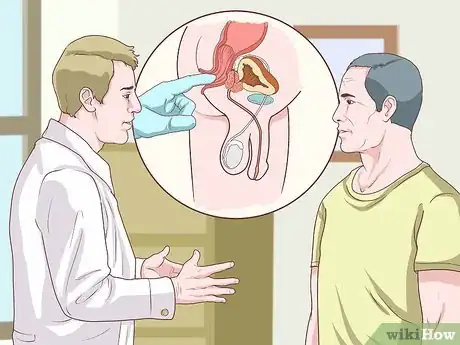

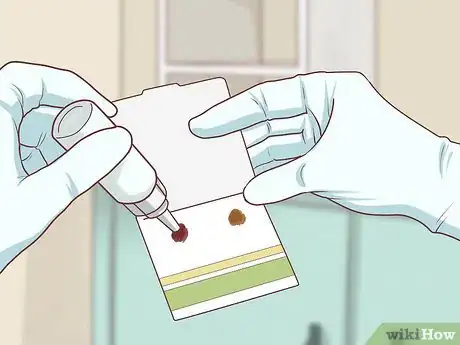
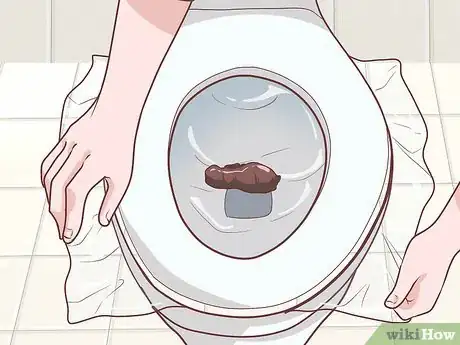




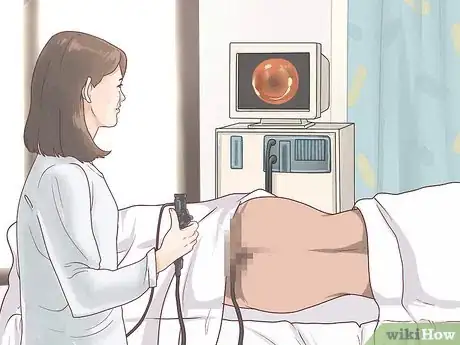
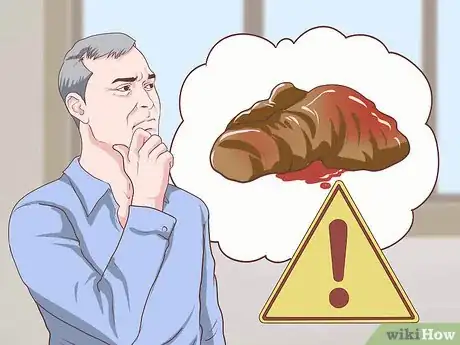
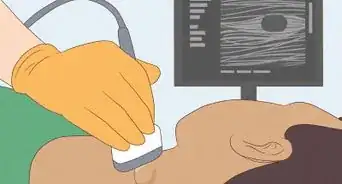

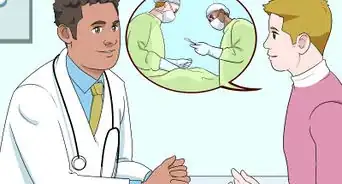


-Step-13.webp)



-Step-8-Version-3.webp)
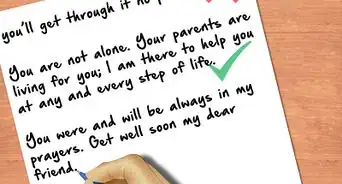

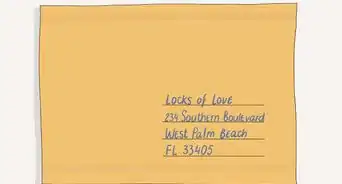









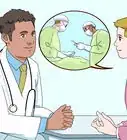




































Medical Disclaimer
The content of this article is not intended to be a substitute for professional medical advice, examination, diagnosis, or treatment. You should always contact your doctor or other qualified healthcare professional before starting, changing, or stopping any kind of health treatment.
Read More...